The first step in getting your dream job as a police officer after graduating from the academy is to craft a detailed resume. It needs to show how your training and experience, such as enforcing the law, handling K-9s, and resolving conflict, prepared you for the role. Learn how to write a police officer resume, and find examples you can follow below.
“Police officer resumes should reflect law enforcement training, conflict resolution, and public service. Show your commitment to safety and community.”
Most Popular Police Officer Resumes
NYPD Police Officer Resume
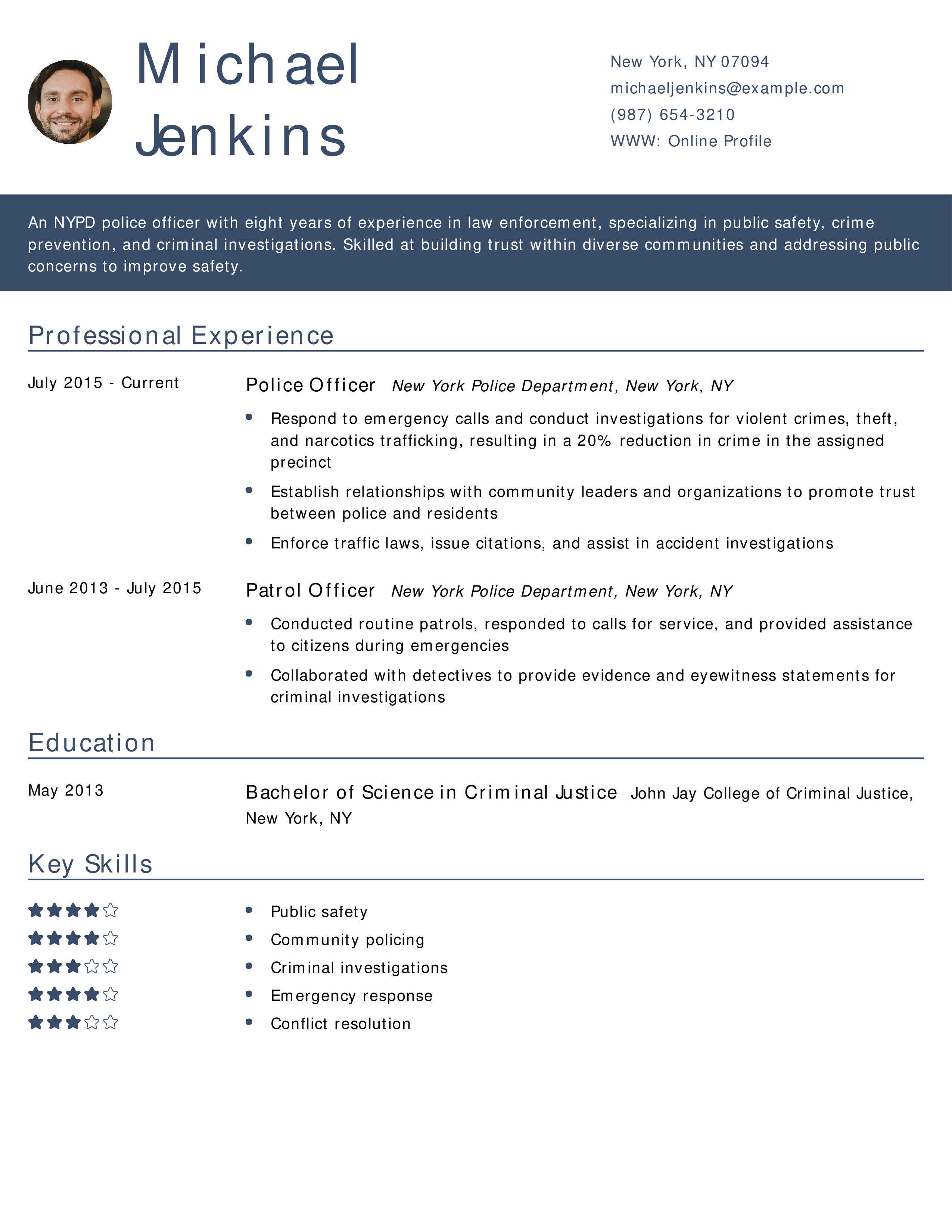
Why This Resume Is a Great Example
Michael’s resume highlights his dedication to community policing and public safety. His measurable achievements, like reducing crime rates, demonstrate his effectiveness as an NYPD officer.
Key Tip: Quantify your impact whenever possible to stand out.
Learn more about resume skills.
Campus Police Officer Resume
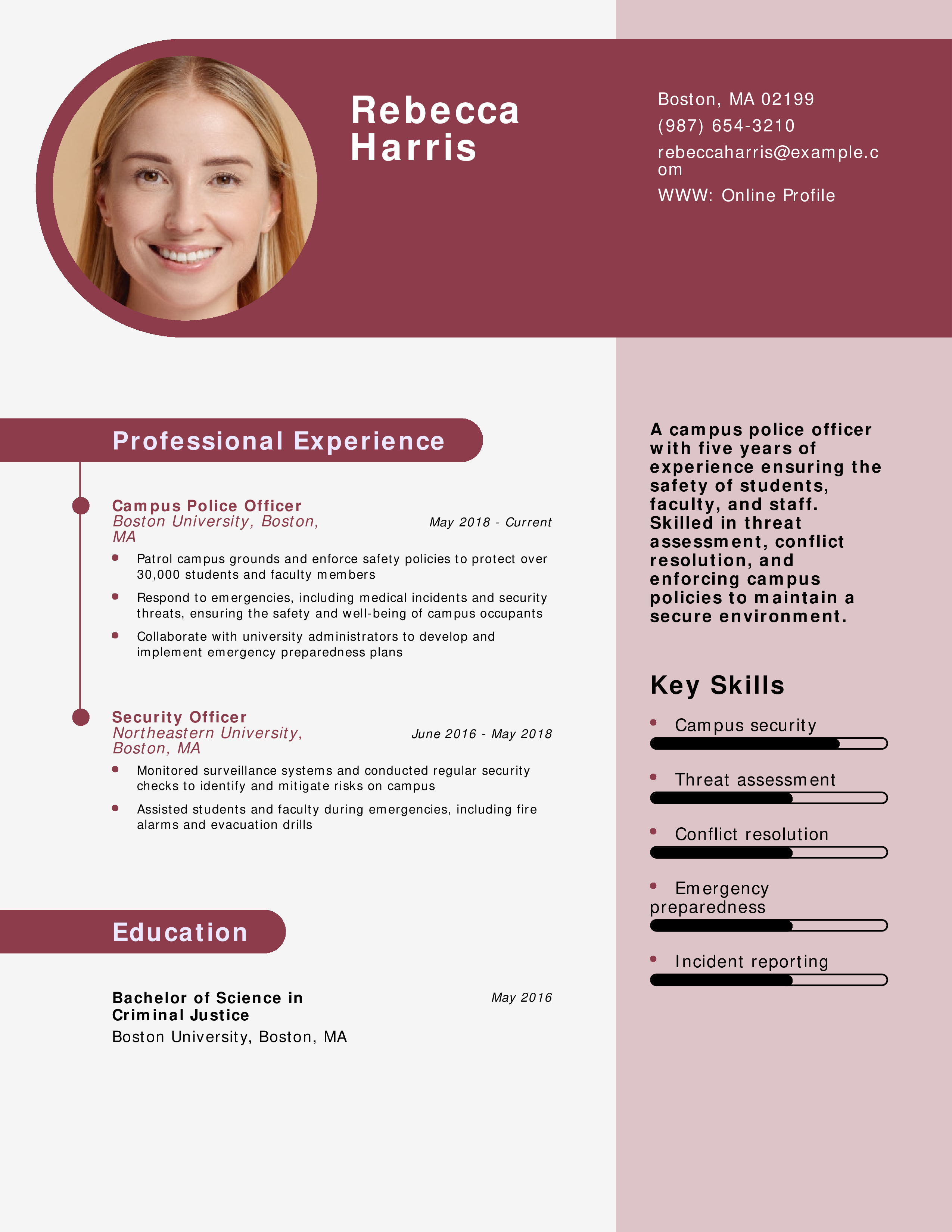
Why This Resume Is a Great Example
Rebecca’s resume focuses on her ability to maintain a safe environment on a large campus. Her collaboration with administrators and emphasis on emergency preparedness make her a strong candidate for campus police roles.
Key Tip: Highlight your experience in creating and enforcing safety protocols.
Learn more in resume summary examples.
Police Sergeant Resume
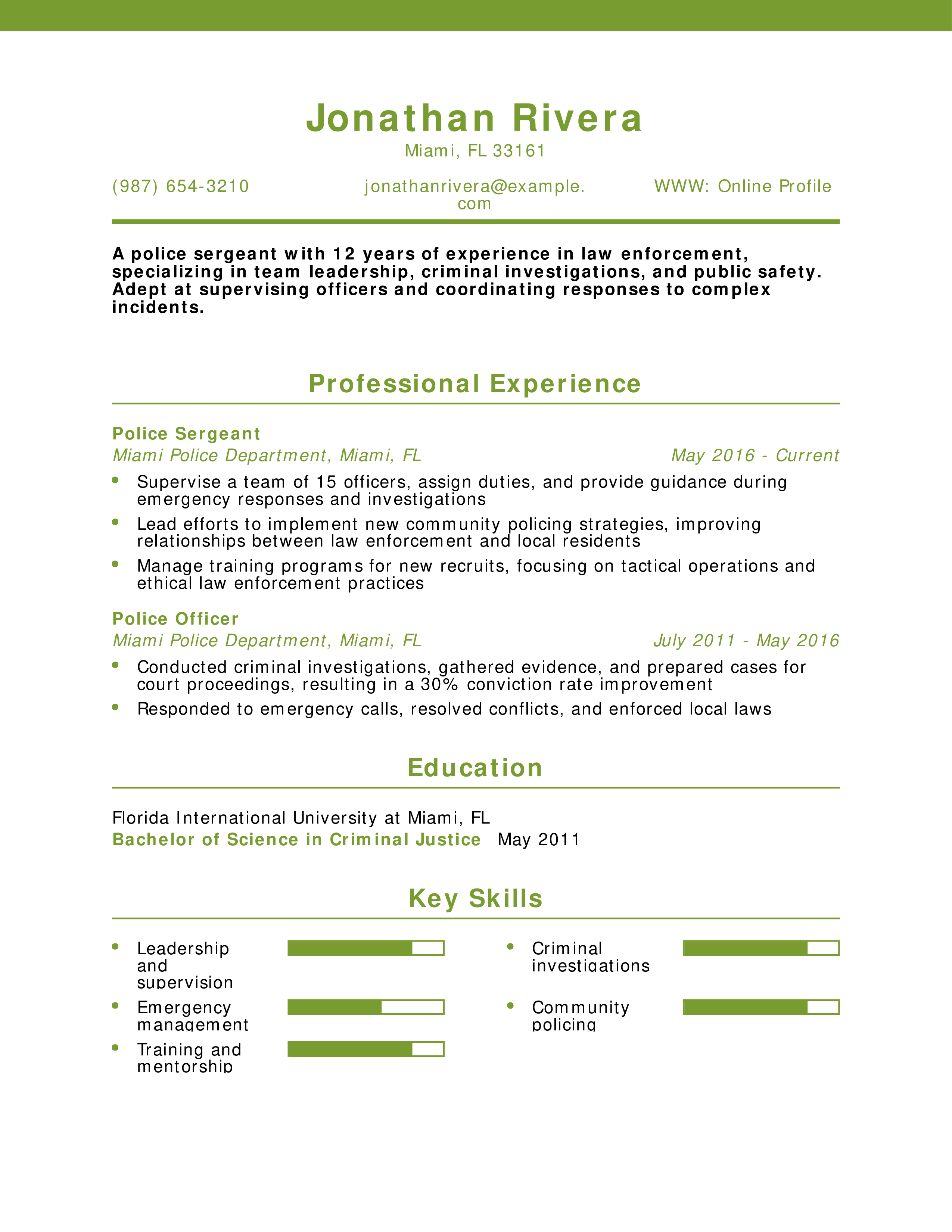
Why This Resume Is a Great Example
Jonathan’s resume emphasizes his leadership skills as a sergeant, highlighting his ability to train officers and implement new strategies. His measurable results, like improved conviction rates, demonstrate his impact.
Key Tip: Showcase your leadership accomplishments to stand out for supervisory roles.
Learn more in resume objective examples.
Police Chief Resume
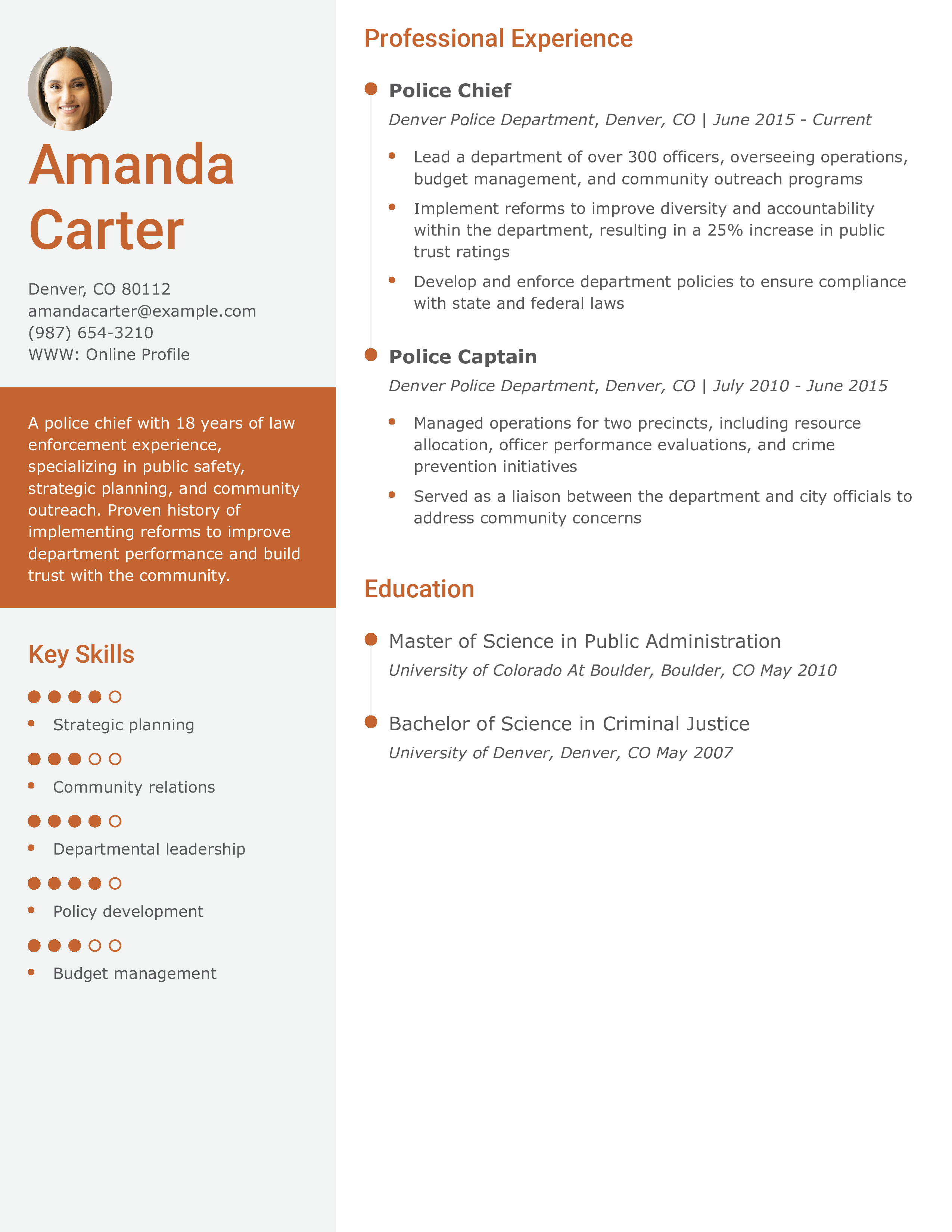
Why This Resume Is a Great Example
Amanda’s resume highlights her extensive experience in law enforcement leadership and her commitment to departmental reform. Her ability to improve public trust and manage a large team makes her an excellent candidate for top police roles.
Key Tip: Include specific reforms or initiatives to demonstrate leadership impact.
Learn more in resume outline examples.
Entry-Level Police Officer Resume
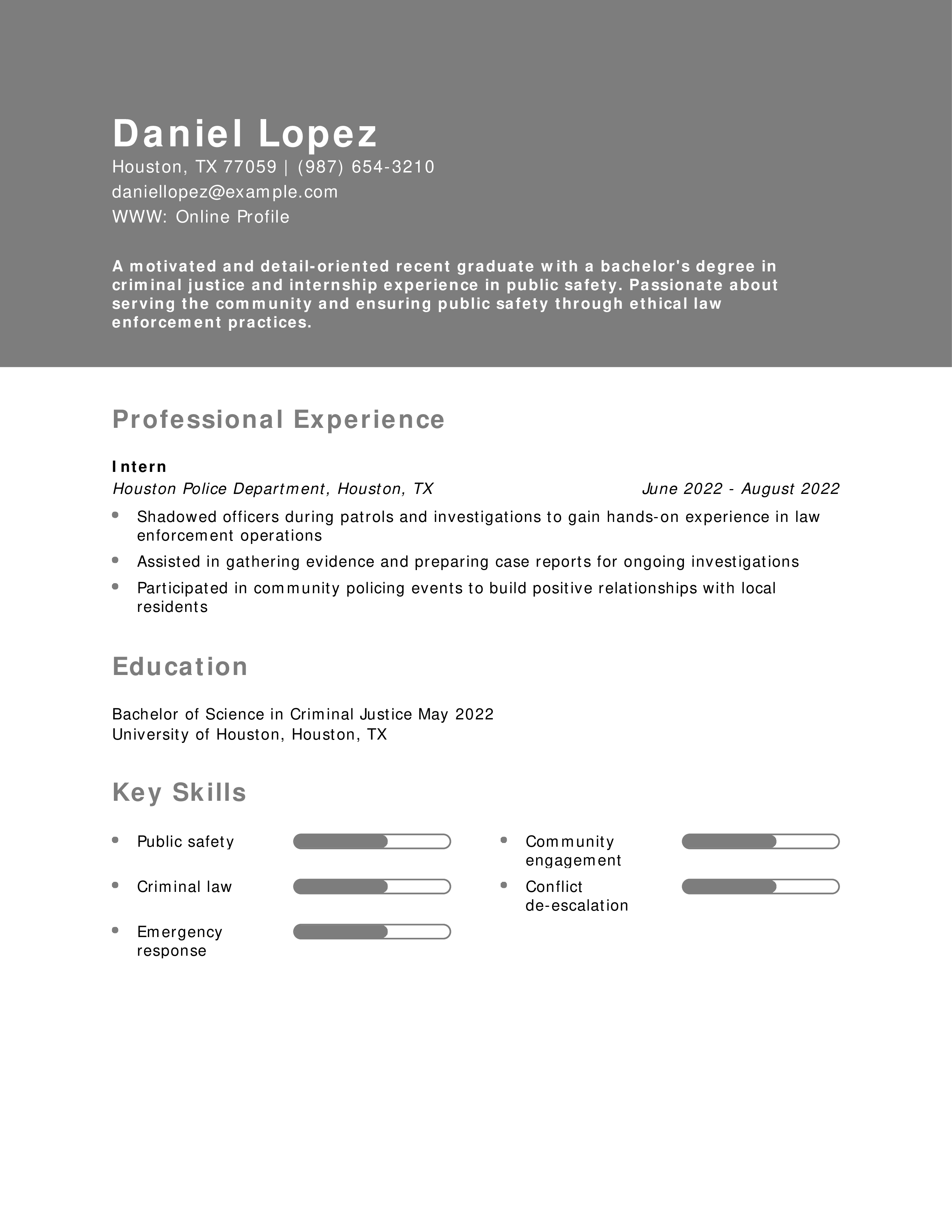
Why This Resume Is a Great Example
Daniel’s resume effectively demonstrates his academic foundation and internship experience, making him a strong candidate for entry-level roles. His enthusiasm for ethical law enforcement and community engagement is evident.
Key Tip: Highlight relevant internships and academic achievements to stand out as a recent graduate.
Learn more about how to list relevant coursework on resumes.
Experienced Police Officer Resume

Why This Resume Is a Great Example
James’ resume emphasizes his decade-long career in law enforcement, showcasing measurable results such as an 80% case resolution rate. His focus on community engagement makes him an asset to any department.
Key Tip: Quantify achievements to demonstrate the impact of your work.
Learn more in resume summary examples.
Public Safety Officer Resume
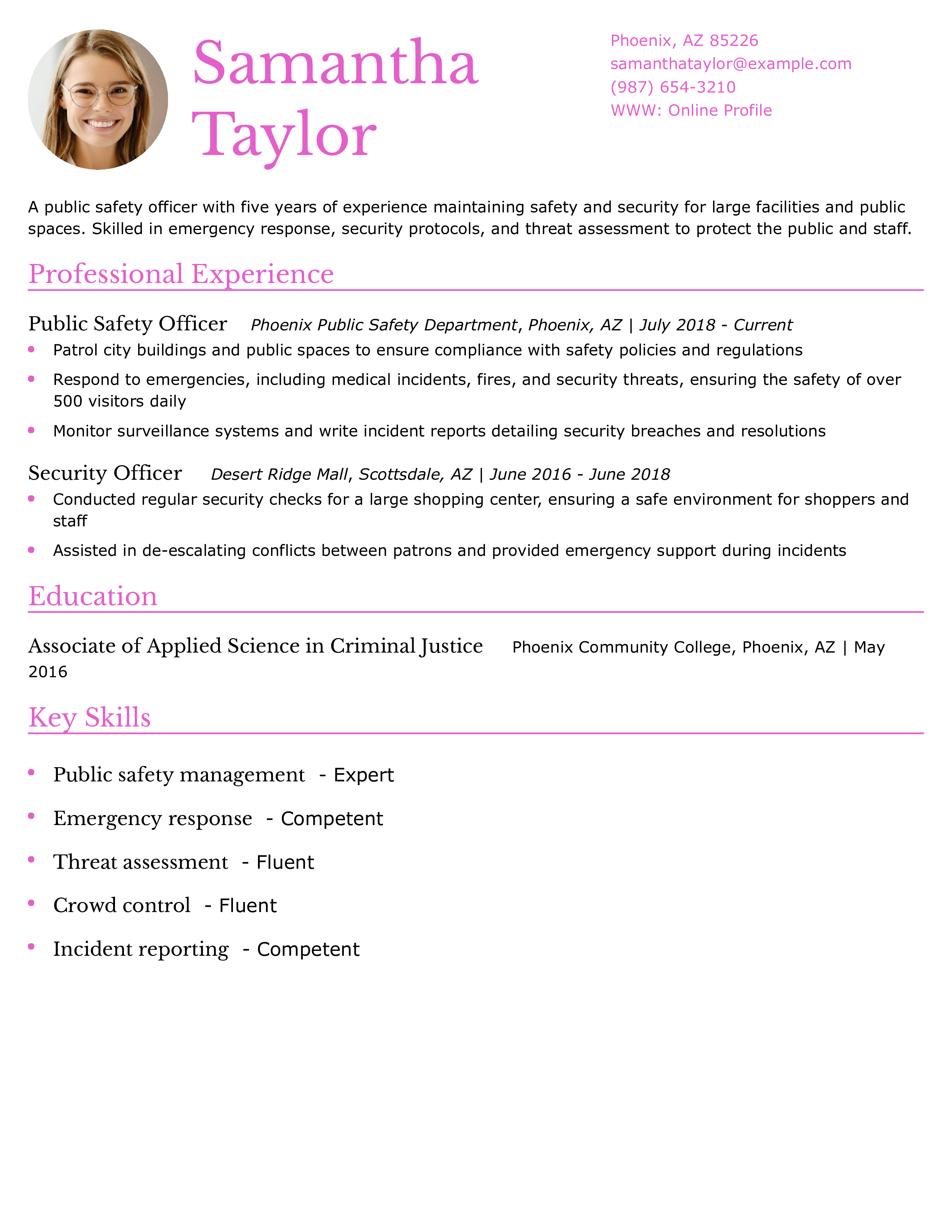
Why This Resume Is a Great Example
Samantha’s resume highlights her ability to handle high-pressure situations in public safety roles. Her combination of surveillance, emergency response, and conflict resolution skills makes her an excellent candidate for public safety positions.
Key Tip: Include diverse skills like threat assessment and surveillance to show your versatility.
Learn more about resume skills.
Federal Police Officer Resume
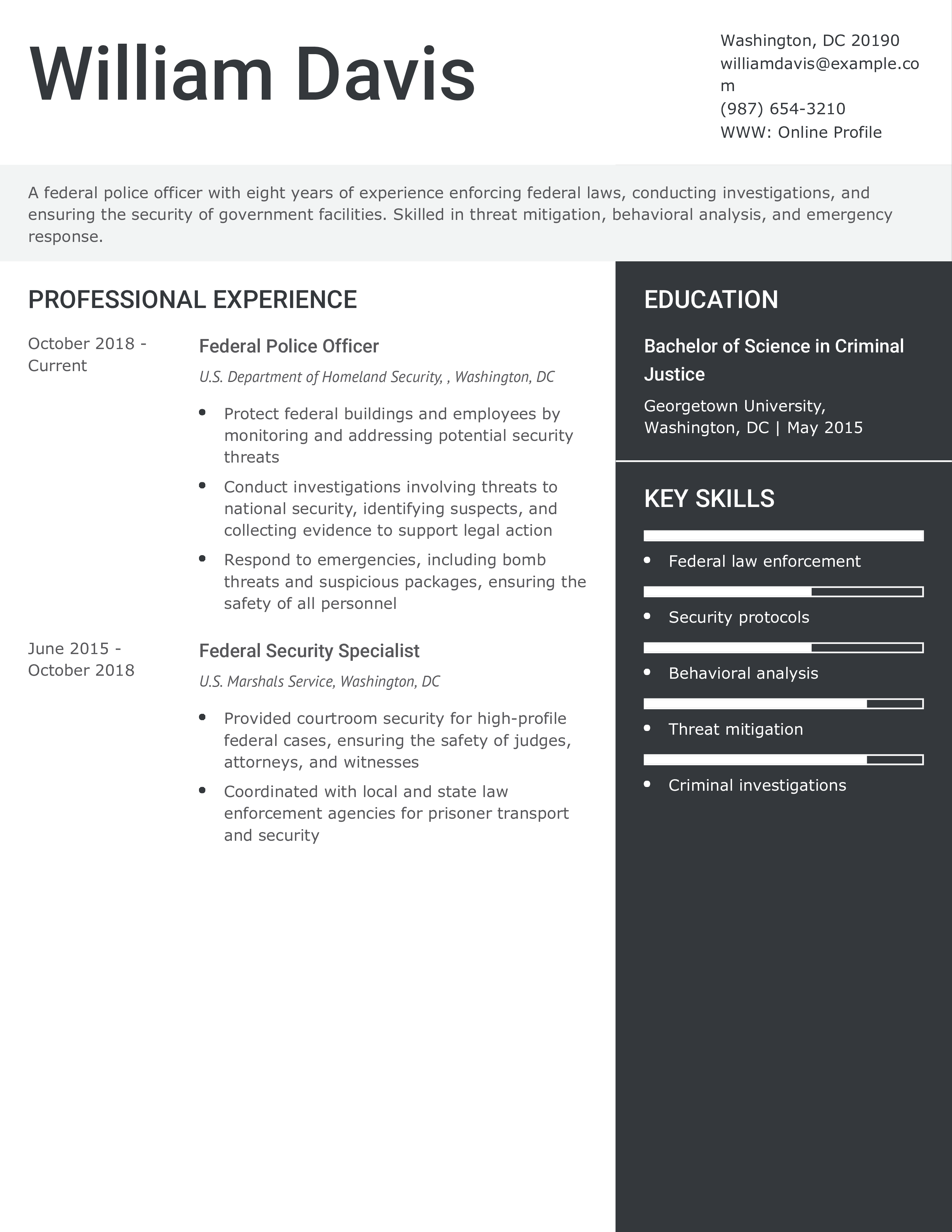
Why This Resume Is a Great Example
William’s resume demonstrates his expertise in federal law enforcement, including his ability to handle high-risk situations and conduct sensitive investigations. His experience with security protocols and federal agencies makes him highly qualified.
Key Tip: Highlight experience with specific agencies to show your familiarity with federal procedures.
Learn more about how to list certifications on a resume.
Retired Police Officer Resume
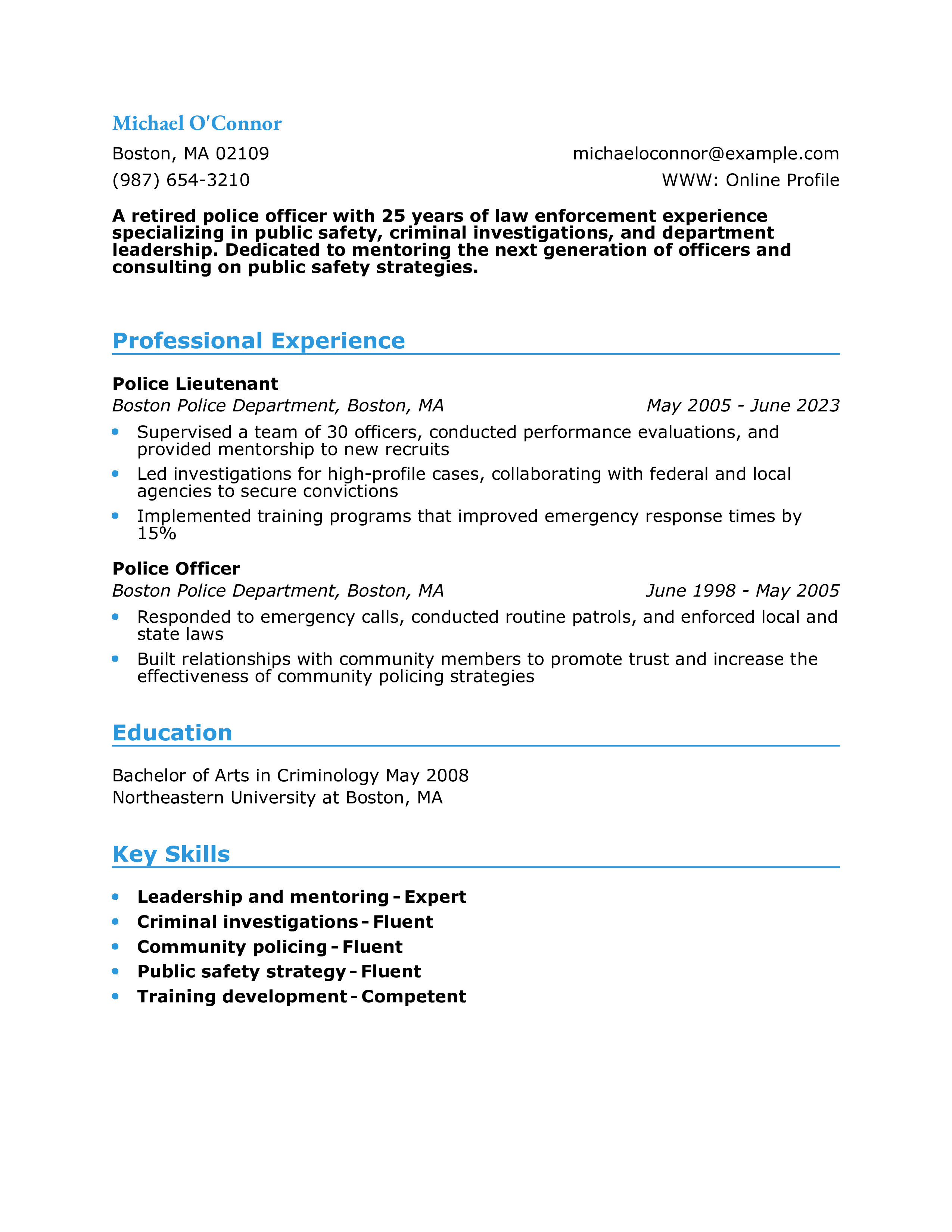
Why This Resume Is a Great Example
Michael’s resume emphasizes his leadership experience and commitment to mentoring future officers. His ability to implement effective strategies and his long tenure in law enforcement demonstrate his expertise.
Key Tip: For retired professionals, focus on leadership and mentoring experience to show ongoing value.
Learn more about how far back a resume should go.
Auxiliary Police Officer Resume

Why This Resume Is a Great Example
Jessica’s resume demonstrates her dedication to supporting law enforcement through auxiliary roles. Her focus on community outreach and safety initiatives highlights her commitment to public service.
Key Tip: Include examples of volunteer or part-time roles to emphasize relevant experience.
Learn more in resume outline examples.
Police Detective Resume
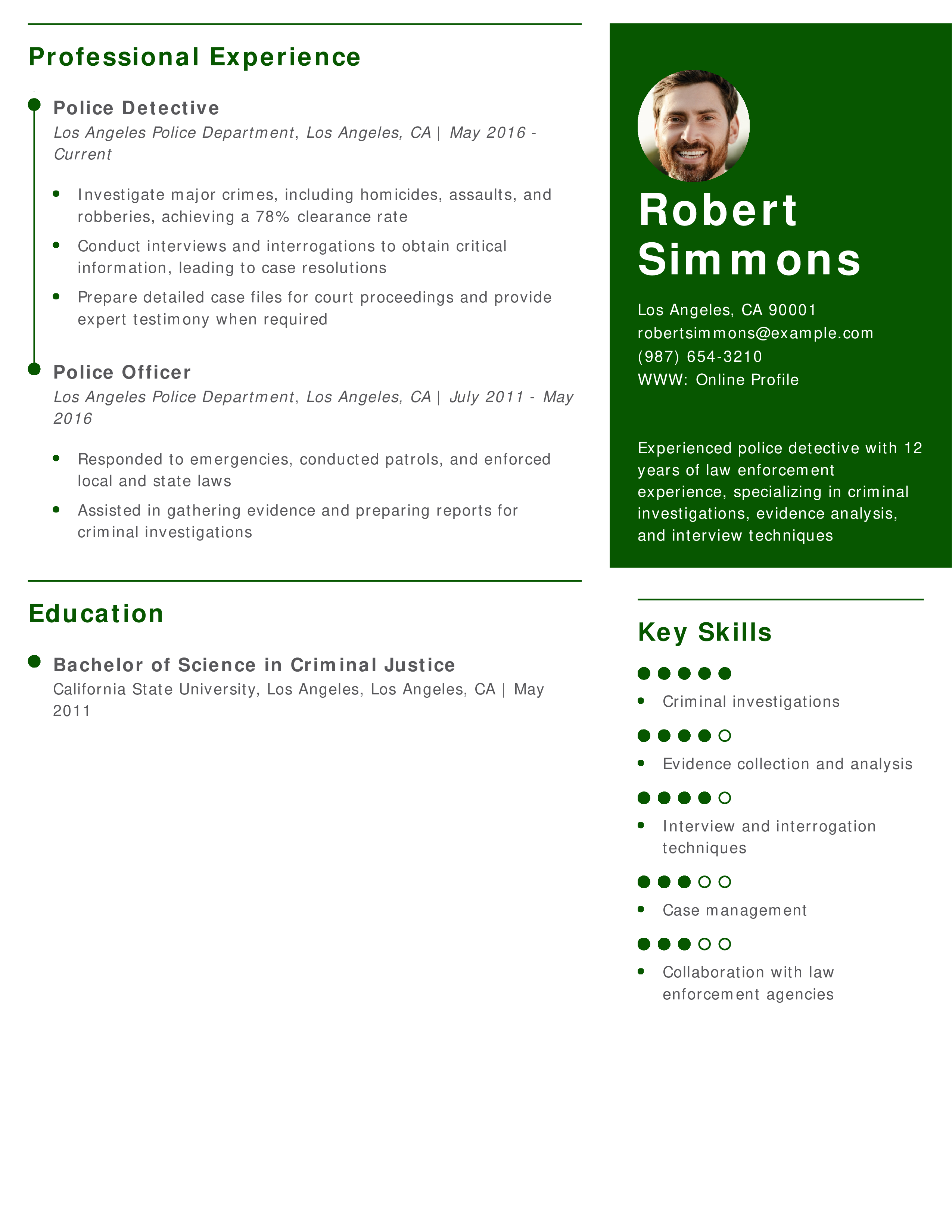
Why This Resume Is a Great Example
Robert’s resume emphasizes his expertise in solving major crimes and highlights his strong case management skills. The 78% clearance rate demonstrates his effectiveness in law enforcement.
Key Tip: Use specific metrics like clearance rates to showcase your success.
Learn more about resume skills.
Police Lieutenant Resume
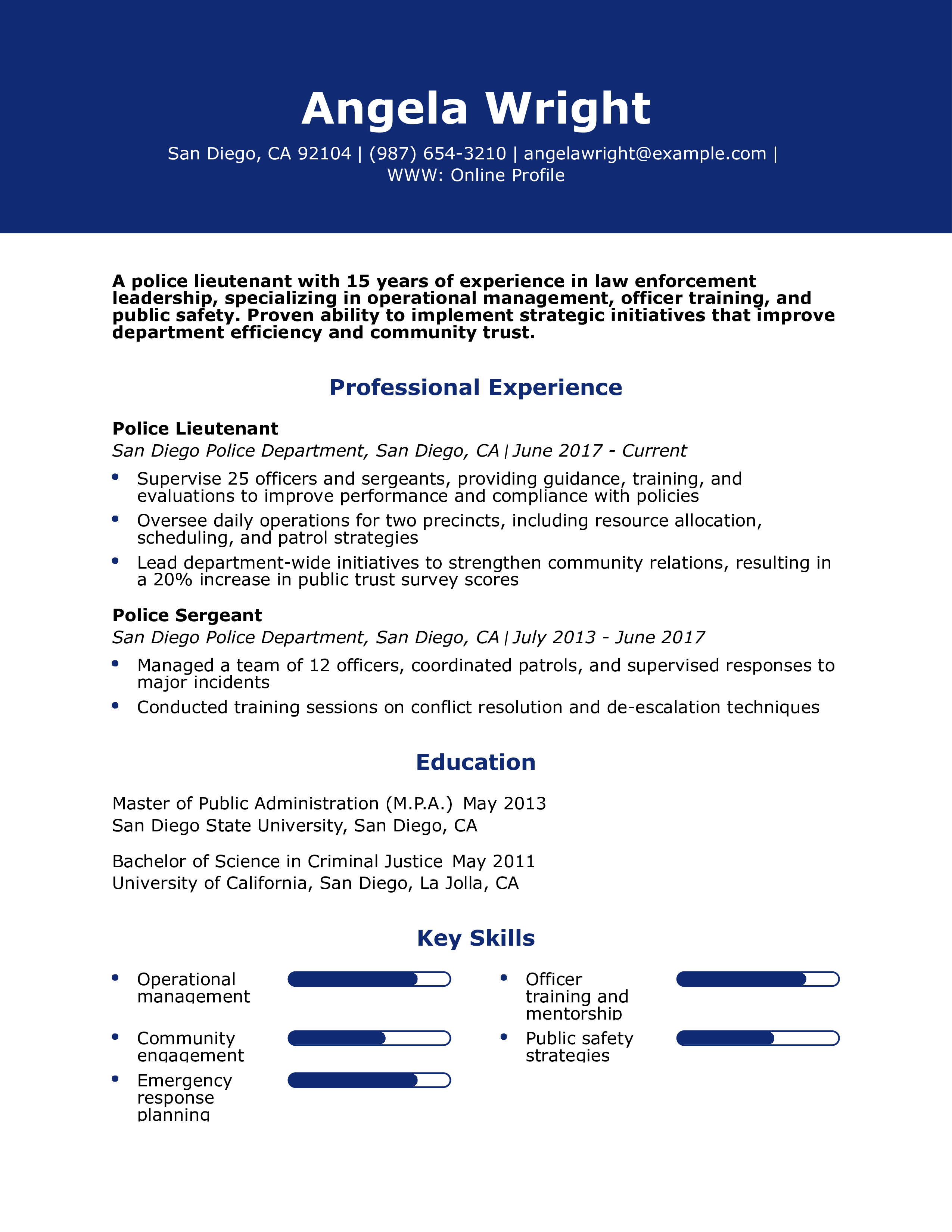
Why This Resume Is a Great Example
Angela’s resume highlights her leadership experience and ability to improve public trust through strategic initiatives. Her dual focus on operational management and officer mentorship makes her a valuable asset to any department.
Key Tip: Include leadership metrics to demonstrate your effectiveness.
Learn more in resume objective examples.
K9 Police Officer Resume
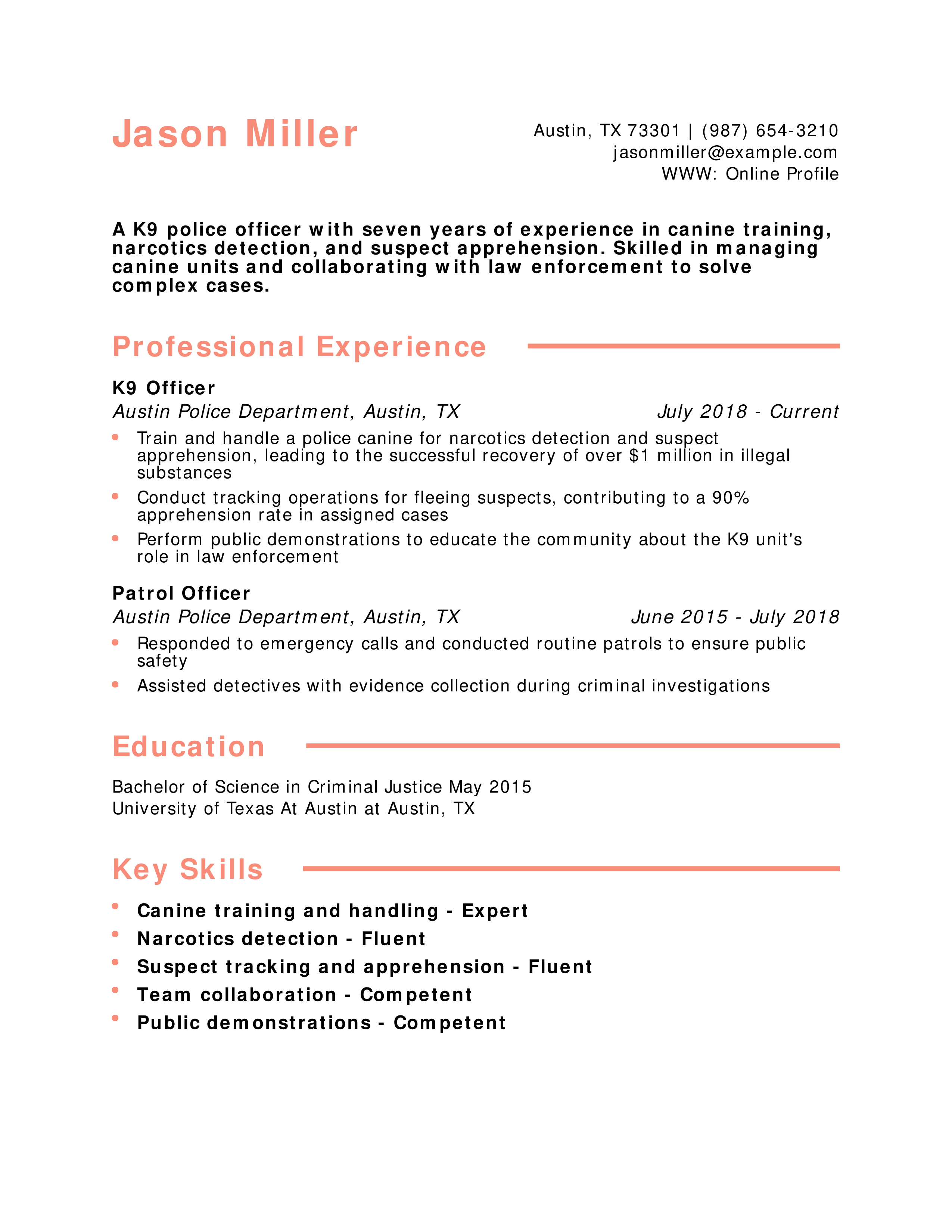
Why This Resume Is a Great Example
Jason’s resume showcases his specialized skills in K9 handling and his measurable achievements in narcotics detection and suspect apprehension. His experience strengthens his appeal for canine-focused law enforcement roles.
Key Tip: Highlight unique law enforcement skills, such as canine handling, to stand out.
Learn more in resume outline examples.
Traffic Police Officer Resume
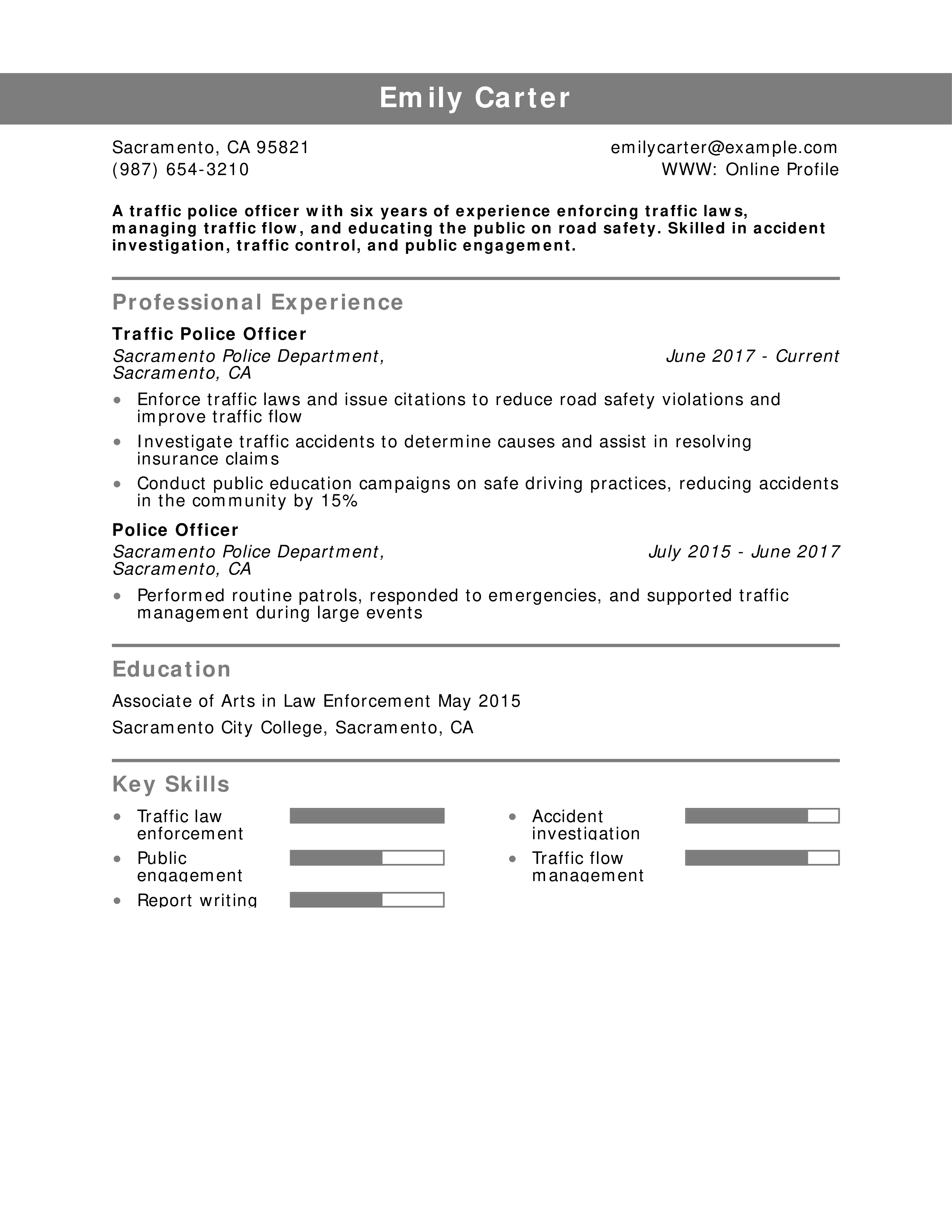
Why This Resume Is a Great Example
Emily’s resume highlights her specialization in traffic law enforcement and her success in reducing accidents through public education initiatives. Her skills make her an excellent candidate for traffic-focused roles.
Key Tip: Include public engagement efforts demonstrating your ability to foster safer communities.
Learn more about how to make a resume.
School Resource Officer Resume
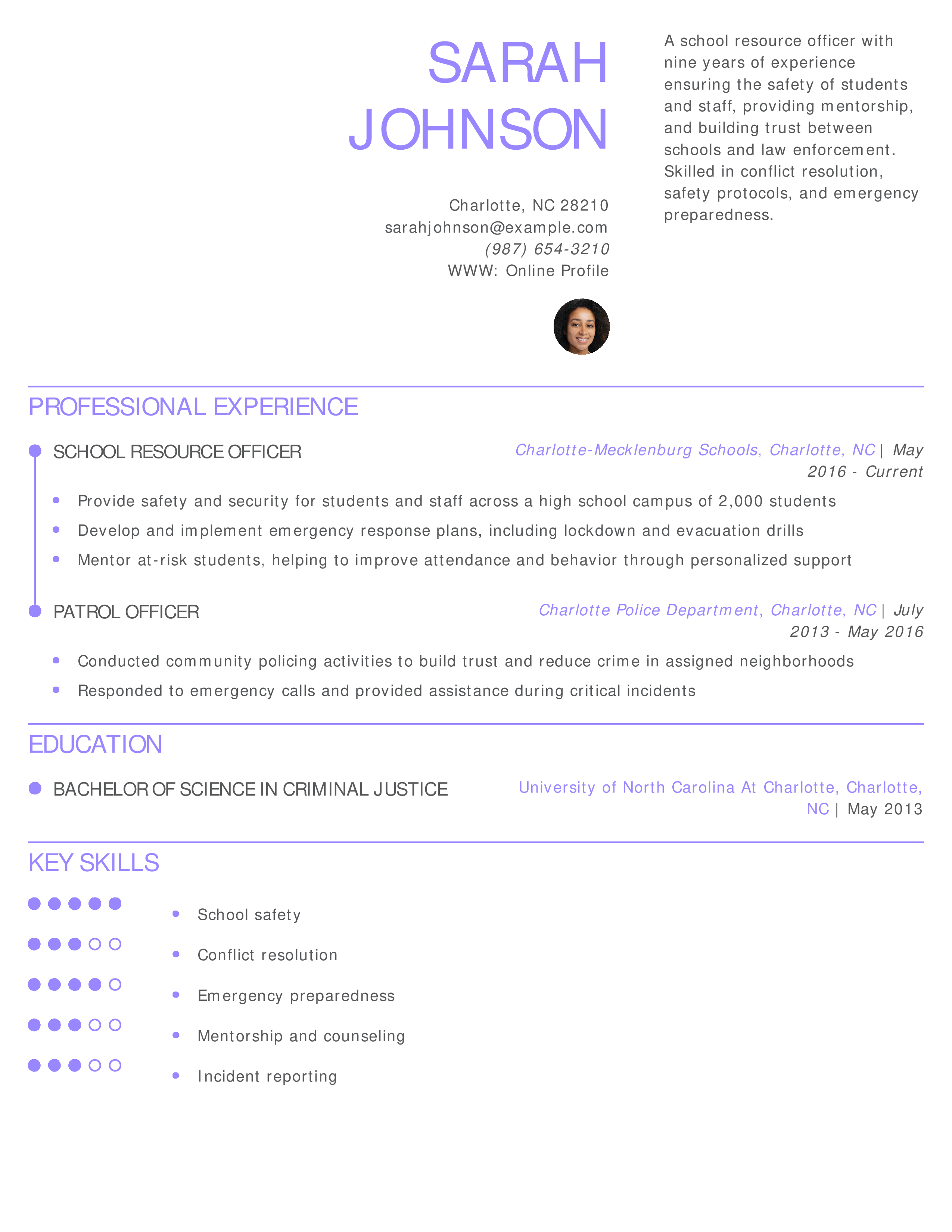
Why This Resume Is a Great Example
Sarah’s resume demonstrates her ability to maintain school safety while mentoring students and fostering positive relationships. Her focus on emergency preparedness and student support makes her ideal for school resource roles.
Key Tip: Highlight mentorship and emergency planning to stand out in resource officer applications.
Learn more about resume skills.
SWAT Team Officer Resume
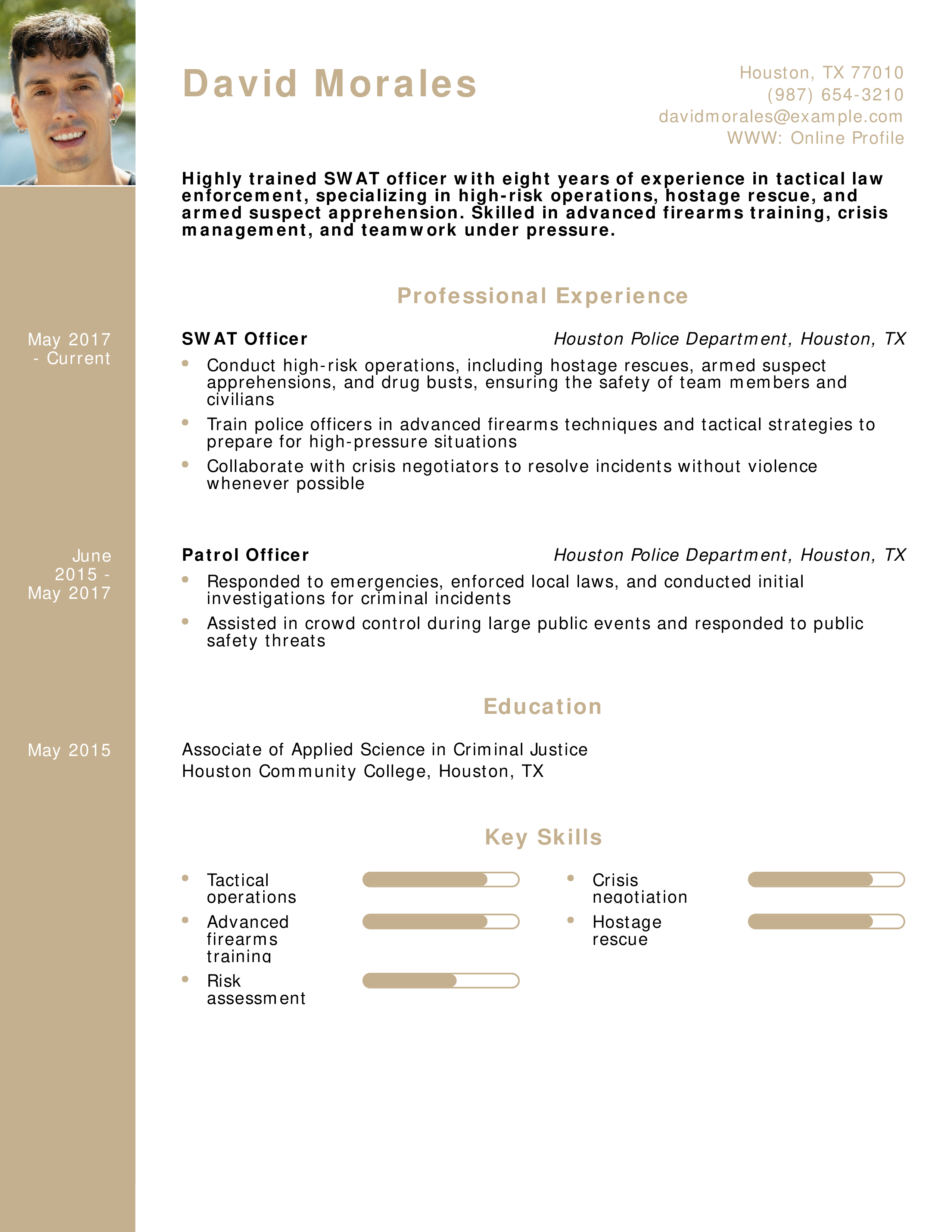
Why This Resume Is a Great Example
David’s resume highlights his specialized skills in tactical law enforcement, showing his ability to handle high-risk situations with precision and expertise. His training contributions demonstrate leadership and knowledge sharing.
Key Tip: Include specific tactical training and high-stakes operations to highlight specialized skills.
Learn more about resume skills.
Police Academy Instructor Resume
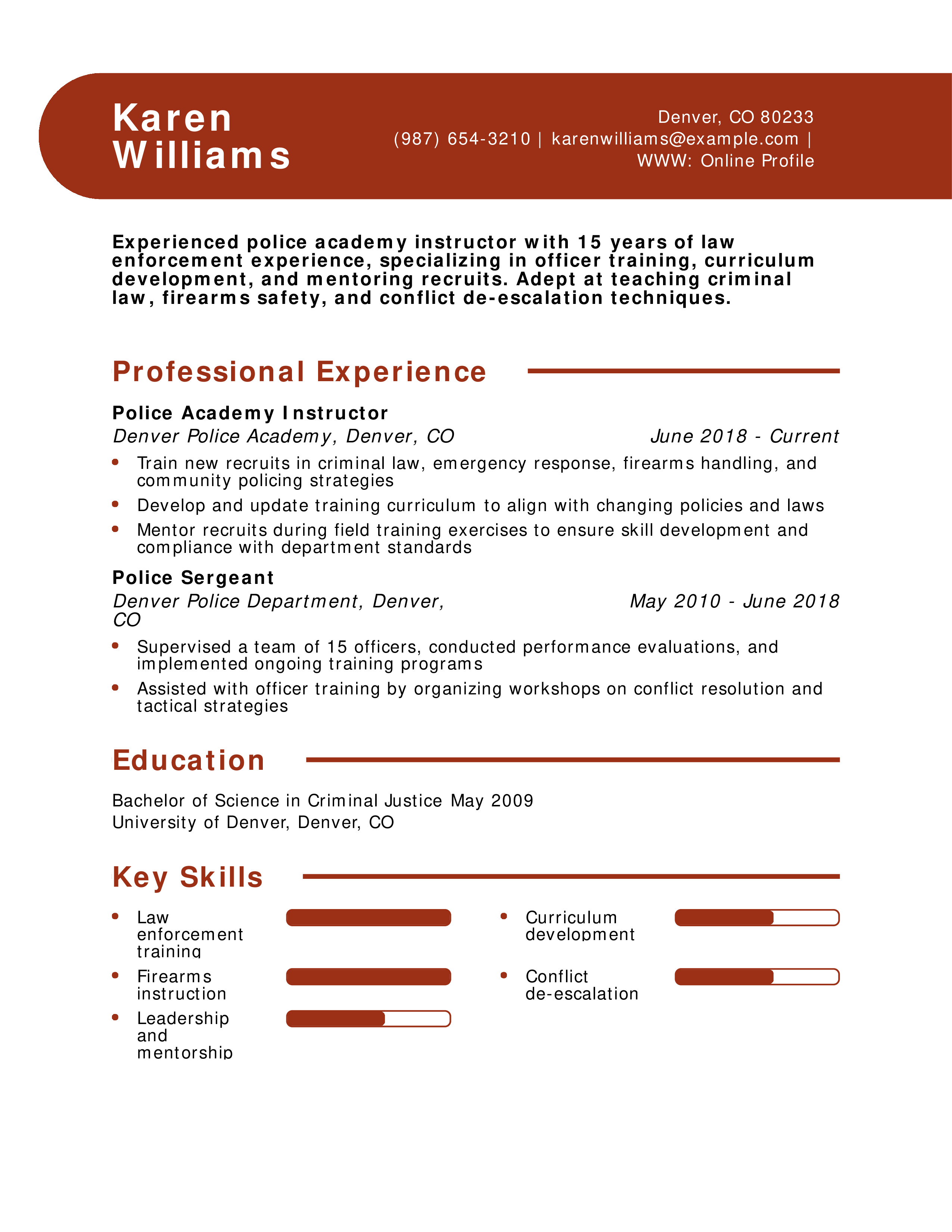
Why This Resume Is a Great Example
Karen’s resume showcases her expertise in training and mentoring new recruits, highlighting her ability to shape the next generation of law enforcement professionals. Her curriculum development experience adds further value.
Key Tip: For training roles, focus on teaching experience and curriculum development.
Learn more in resume outline examples.
Police Field Training Officer Resume
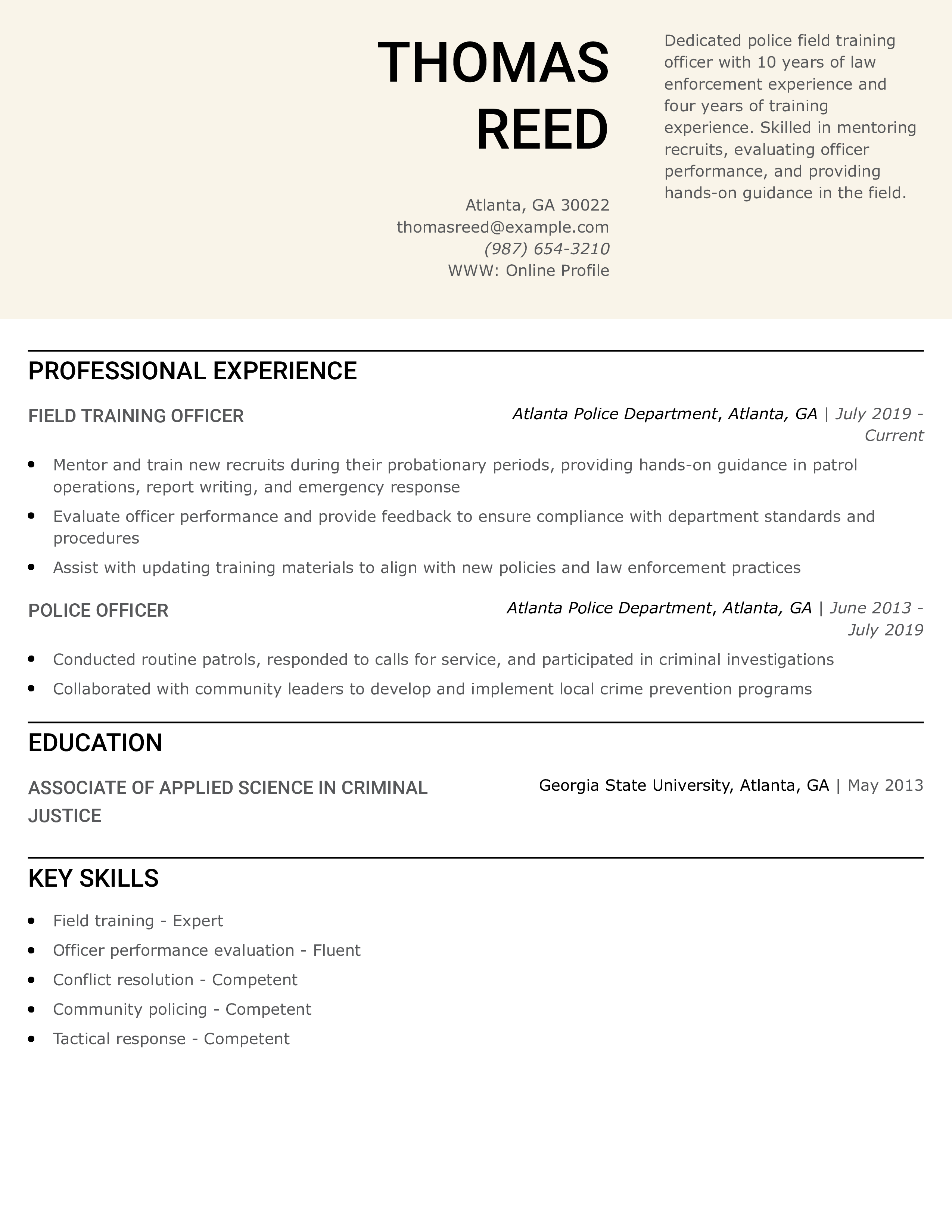
Why This Resume Is a Great Example
Thomas’ resume emphasizes his ability to mentor and guide recruits, which is critical in field training roles. His focus on officer evaluations and compliance with standards highlights his attention to detail and leadership abilities.
Key Tip: Highlight both mentoring and technical law enforcement skills for training roles.
Learn more in resume summary examples.
Patrol Officer Resume
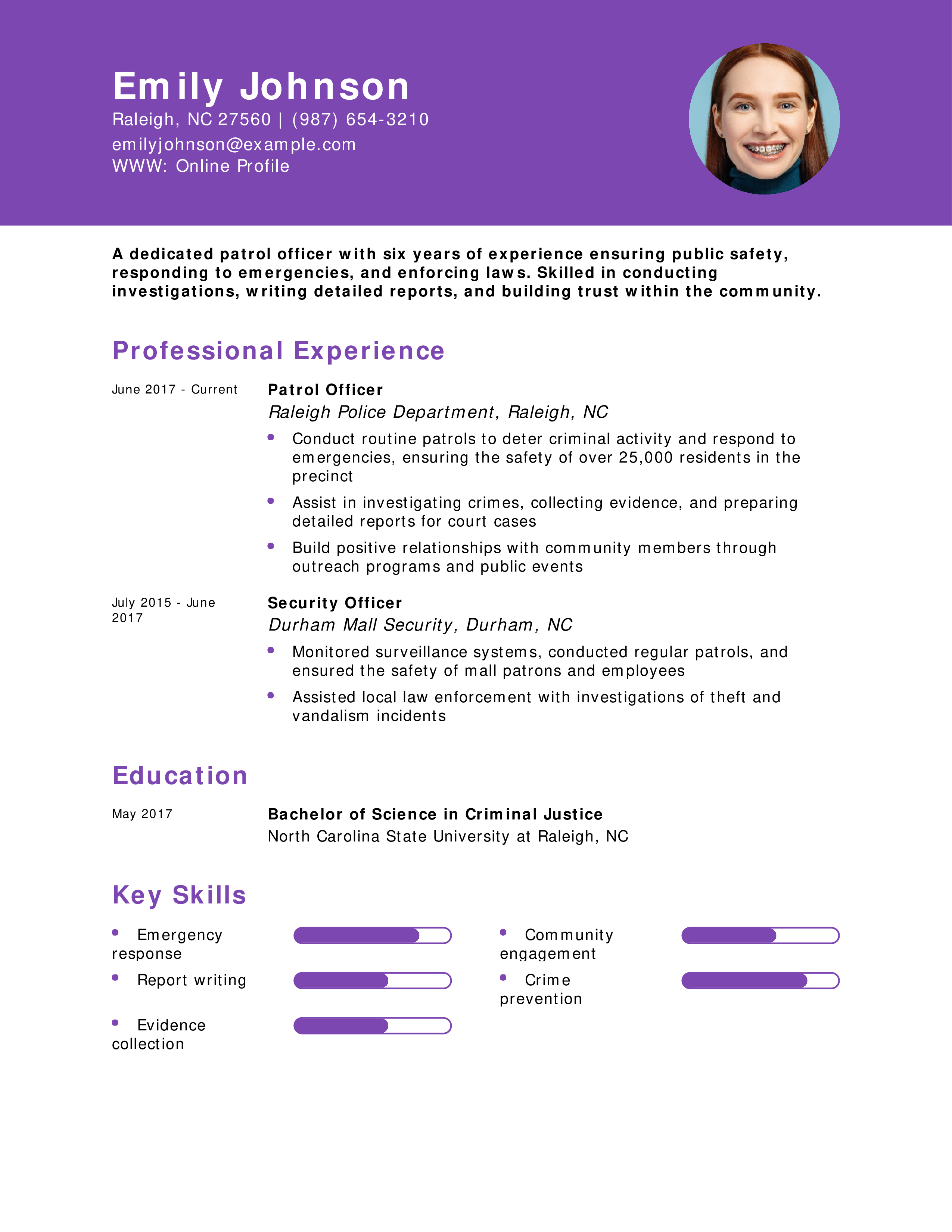
Why This Resume Is a Great Example
Emily’s resume highlights her comprehensive experience in law enforcement and her focus on building community trust. Her detailed crime prevention and evidence collection work demonstrates her attention to detail.
Key Tip: Include a mix of patrol and investigative skills to showcase versatility.
Learn more about resume skills.
Community Policing Officer Resume
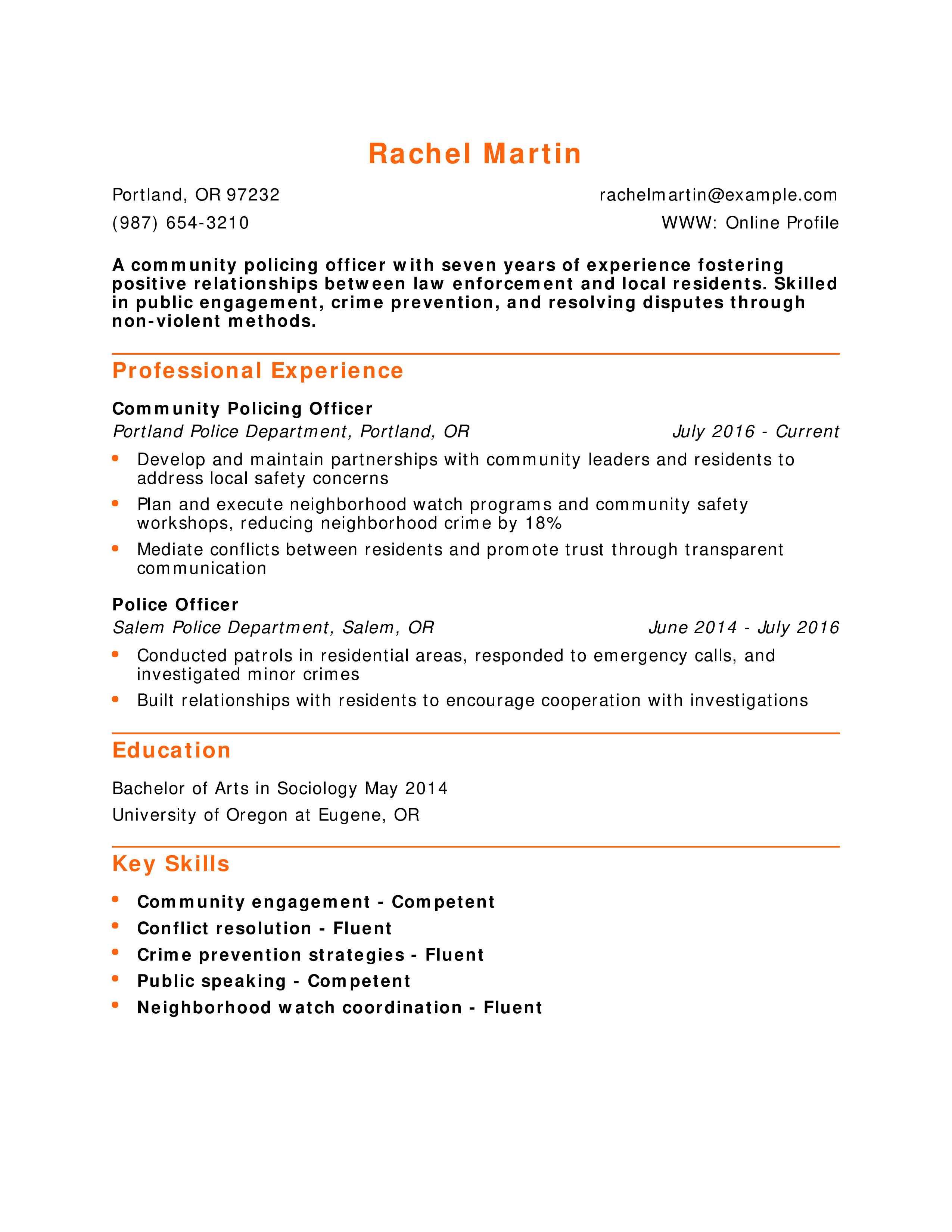
Why This Resume Is a Great Example
Rachel’s resume showcases her focus on community engagement and her success in reducing crime through collaboration. Her proactive efforts in building trust make her a strong candidate for community policing roles.
Key Tip: Highlight public engagement initiatives and measurable results.
Learn more about how to make a resume.
Criminal Investigations Officer Resume
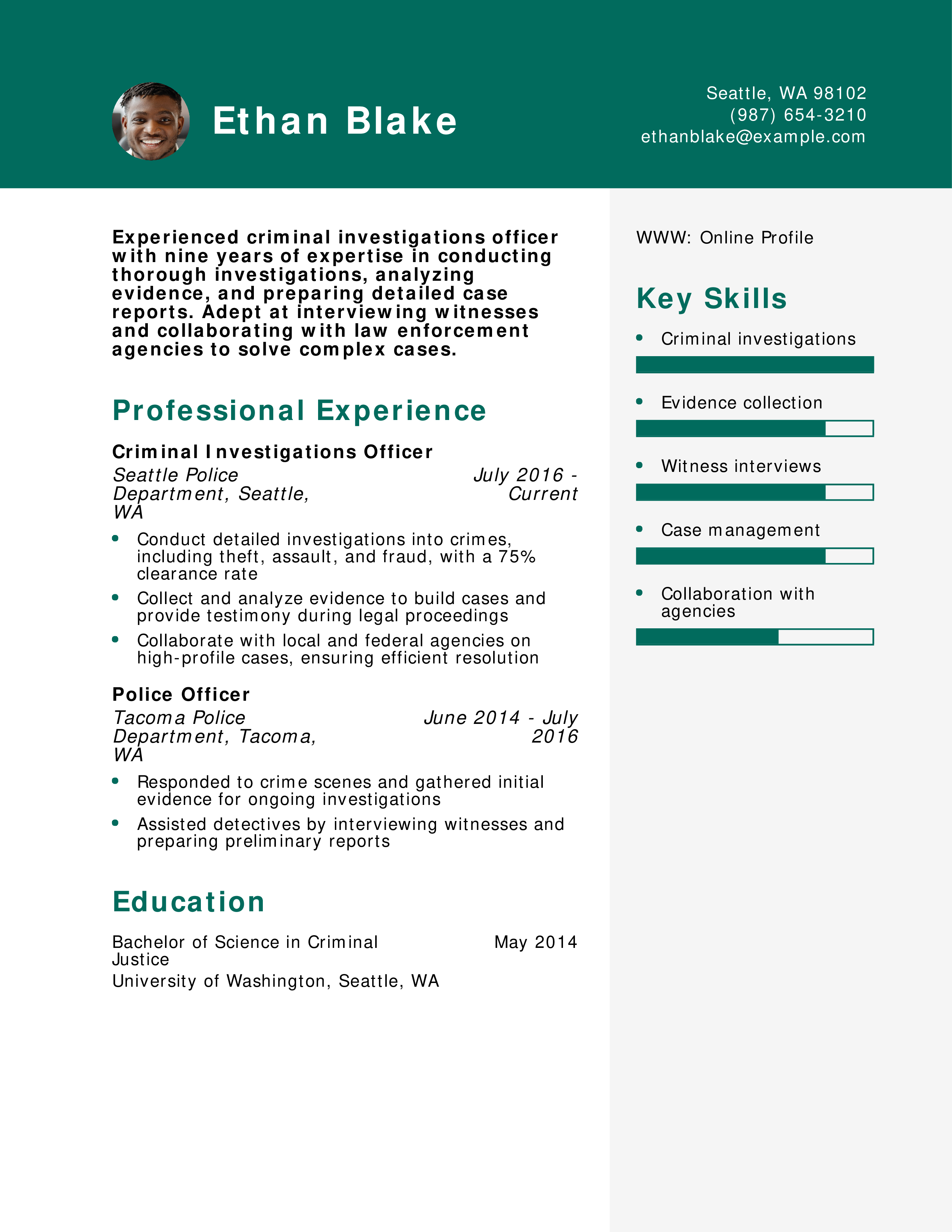
Why This Resume Is a Great Example
Ethan’s resume highlights his investigative expertise, emphasizing his ability to analyze evidence and collaborate with other agencies. His measurable clearance rate adds credibility to his experience.
Key Tip: Include metrics to show investigative success rates.
Learn more in resume summary examples.
Police Dispatcher Resume
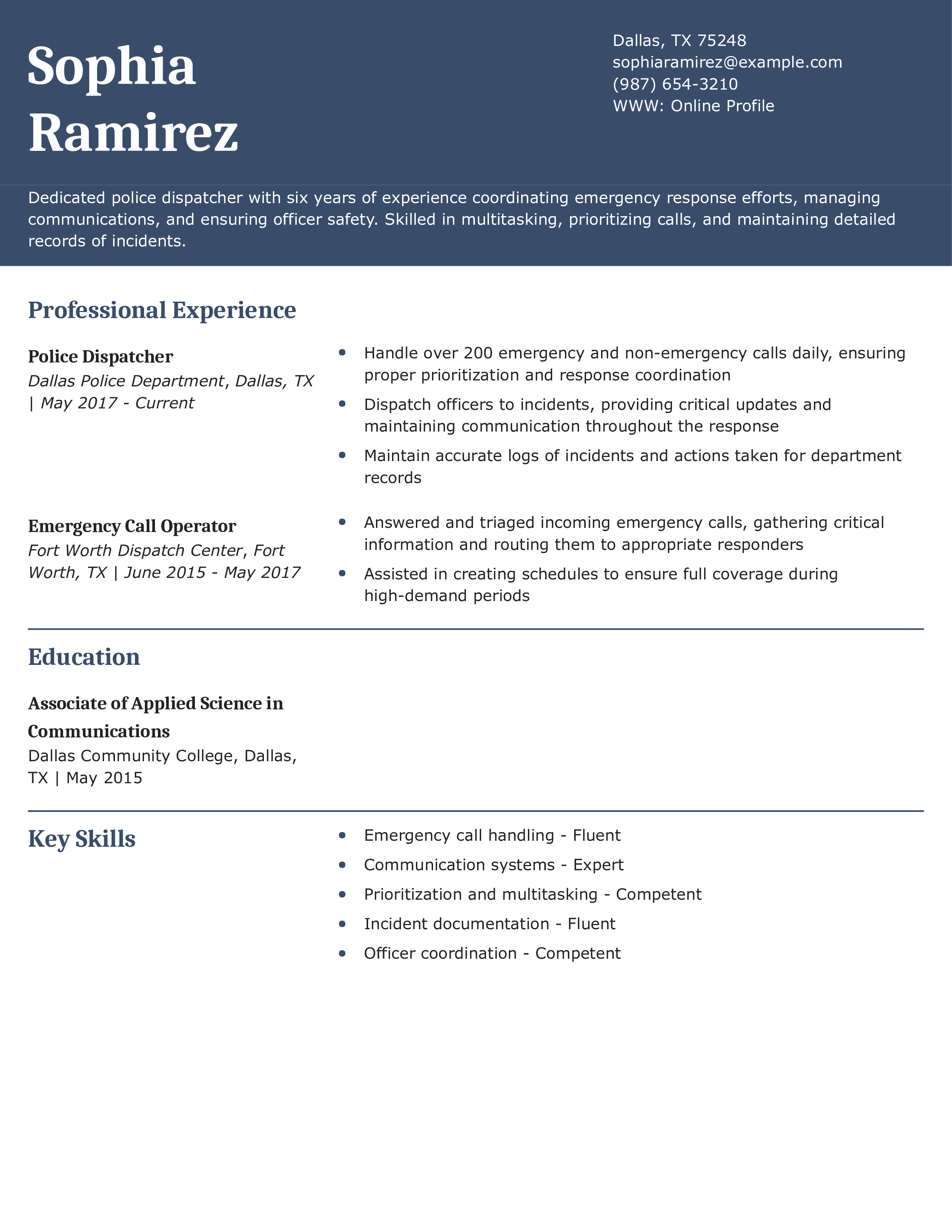
Why This Resume Is a Great Example
Sophia’s resume highlights her multitasking abilities and her critical role in coordinating emergency responses. Her measurable call volume demonstrates her efficiency and effectiveness in a high-pressure role.
Key Tip: Emphasize organizational and multitasking skills for dispatcher roles.
Learn more about resume skills.
State Police Officer Resume
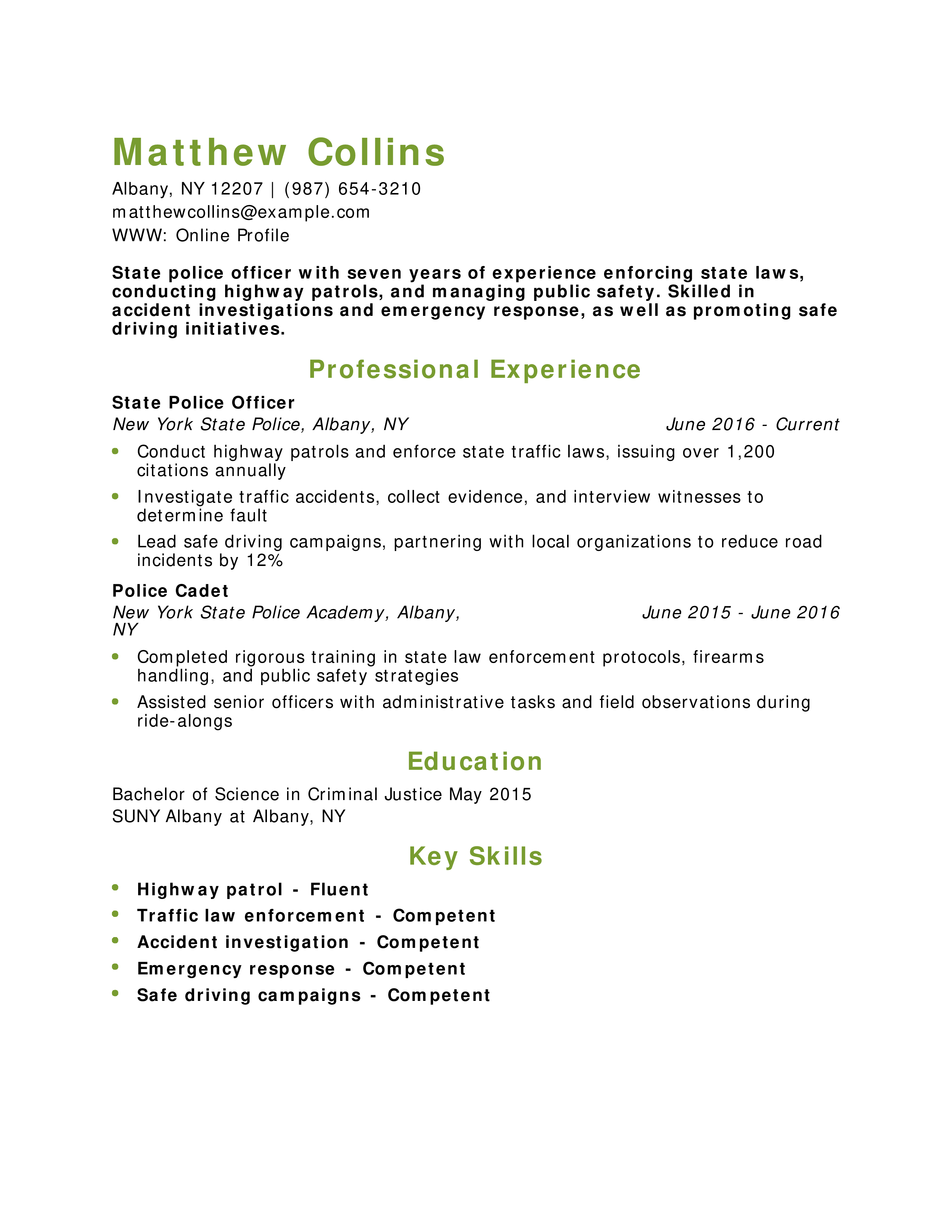
Why This Resume Is a Great Example
Matthew’s resume demonstrates his expertise in state law enforcement and his proactive approach to reducing traffic incidents through safe driving campaigns. His strong metrics make him stand out.
Key Tip: Include community outreach efforts to highlight your ability to connect with the public.
Learn more in how to make a resume.
Border Patrol Agent Resume
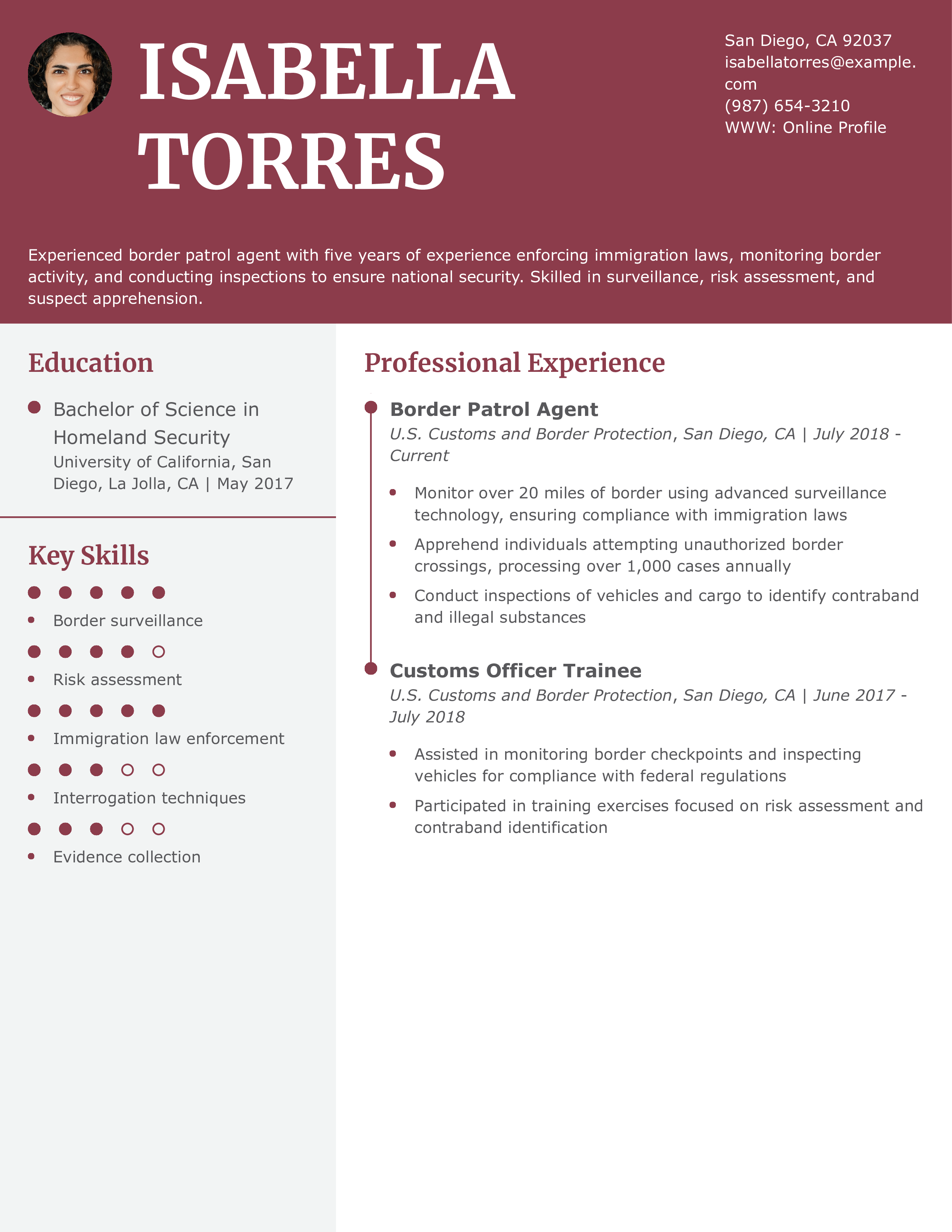
Why This Resume Is a Great Example
Isabella’s resume highlights her expertise in border surveillance and risk assessment. Her ability to process a high volume of cases while maintaining national security demonstrates her proficiency in this specialized role.
Key Tip: Emphasize surveillance and risk assessment skills for border-related positions.
Learn more in resume outline examples.
Reserve Police Officer Resume
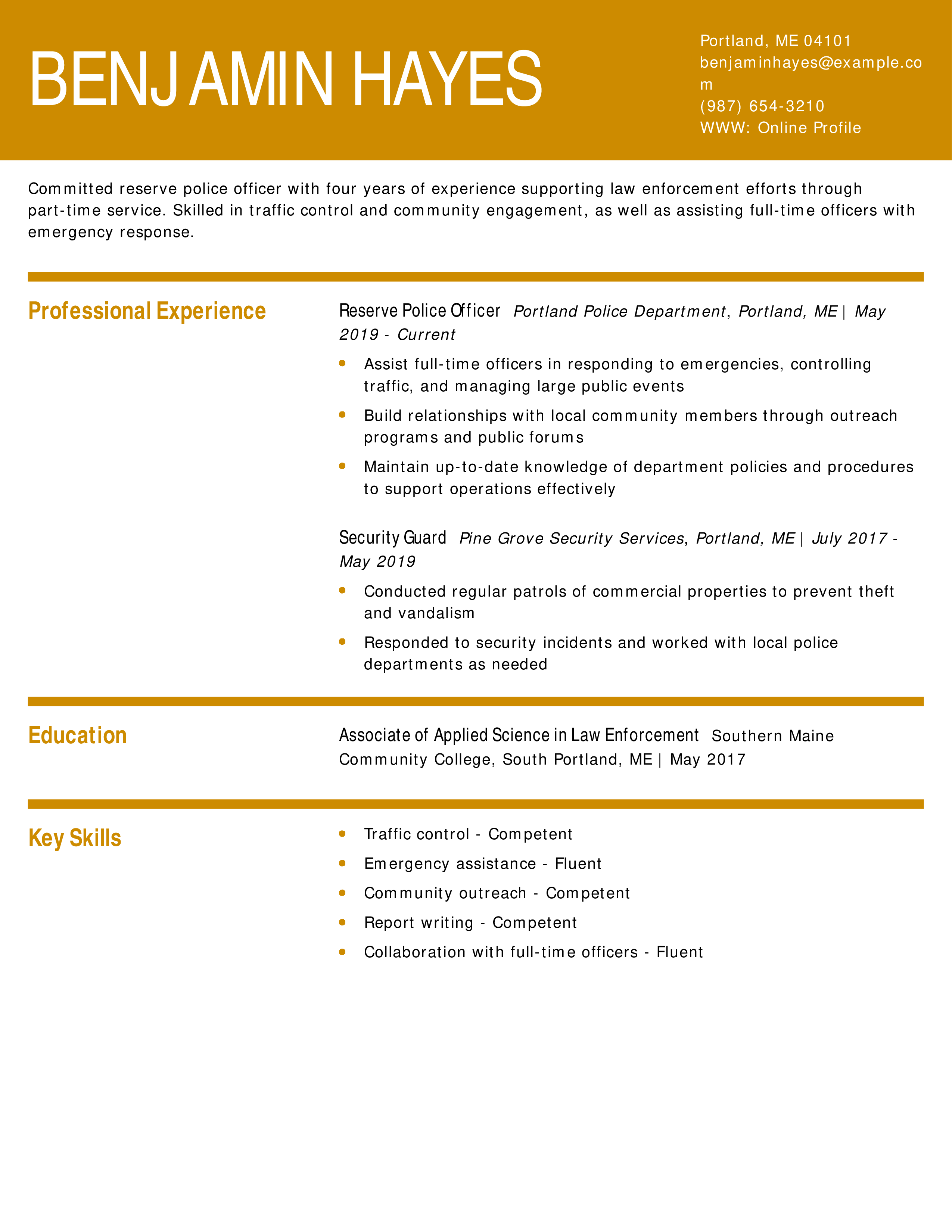
Why This Resume Is a Great Example
Benjamin’s resume highlights his dedication to law enforcement through reserve service, emphasizing his flexibility and support in high-pressure situations. His focus on community engagement strengthens his profile.
Key Tip: For reserve roles, emphasize adaptability and collaboration with full-time officers.
Learn more in how to list relevant coursework on resumes.
Our templates are crafted by professional resume writers to make creating your resume quick, easy, and effective.
- Professional resume template downloads
- Customized cover letter generation
- AI resume writing support
- Career-building resources and advice
Police Officer Text-Only Resume Templates and Examples
How To Write a Police Officer Resume
Track calls handled, response-time improvements, and community initiatives. Measurable reductions in incidents or complaints strengthen credibility.
1. Create a profile by summarizing your police officer qualifications
Start your resume with a short profile paragraph describing your experience as an officer. This will vary depending on your job history. But you can include things like how many years you’ve been in law enforcement, what divisions you’ve worked in, and whether you have any special skills, such as foreign language fluency or experience as a K-9 handler. Show you meet the basic requirements for the job and gain the hiring manager’s interest so they read further.
“Courage is the bridge between fear and duty. Embrace it, honor it, and let it guide you on your noble journey to becoming a police officer,” says expert recruiter Ernestine Council.
Senior-Level Profile Example
Dedicated police officer and lieutenant with nearly 10 years experience working with K-9 partners to detect narcotics and explosives, apprehend suspects, and enforce state and federal laws.
Entry-Level Profile Example
Dedicated police officer with over two years of experience. Skilled at resolving conflicts and disarming hostile situations. Actively engage with community leaders to find relevant solutions and effect positive change. Bilingual: Fluent in English and Spanish.
2. Create a powerful list of your police officer experiences
For each past law enforcement job, list your daily activities and any larger duties, such as scheduling or overseeing patrol operations. You can also include specific achievements or performance metrics, such as the number of incident-free arrests. If you’re not sure which aspects to highlight, refer back to the job posting to get a better idea of what is expected in the new role and focus on any relevant experience.
Senior-Level Professional Experience Example
K-9 Unit Lieutenant
Police Department – City of Coos Bay, Coos Bay, OR | August 2017- present
- Supervise K-9 unit sergeants and staff members
- Assign K-9 police officers to shifts, patrol operations, and investigations
- Review officers’ reports and ensure adherence to all policies and procedures
- Patrol with K-9 officers to maintain strong police presence and deter criminal activity
- Team with trained dogs to enforce laws, respond to emergencies, and find and apprehend suspects
Entry-Level Professional Experience Example
Police Officer
City of Philadelphia, Philadelphia, PA | July 2020 – present
- Patrol assigned area by foot and car to help direct traffic, enforce laws, and ensure public safety
- Answer calls and investigate complaints of criminal activity
- Take proper action at crime scenes by gathering evidence, locating witnesses, and making arrests as needed
- Appear in court to present evidence and testify against defendants
3. List any education and certifications relevant to police officers
A background in criminal justice and advanced credentials can boost your candidacy, and some higher rankings may require a bachelor’s or master’s degree. Your resume should include not just your degree(s) but any relevant certificates or training you’ve done, such as hostage negotiation or Special Weapons and Tactics (SWAT).
Education
Template
- [Degree Name]
- [School Name], [City, State Abbreviation] – [Graduation Year]
Example
- Associate of Applied Science in Criminal Justice
- Central Oregon Community College, Bend, OR – 2020
Certifications
Template
- [Certification Name], [Completion Year]
Example
- Crime Scene Technician, 2022
4. List police officer-related skills and proficiencies
Police officers must be observant, collaborative, physically fit, and can take charge in difficult situations. Add a section to your resume highlighting these skills so the hiring manager quickly sees you’re a strong candidate. Below are common key skills for police officers so you can get started:
| Key Skills and Proficiencies | |
|---|---|
| Armed security | Community engagement |
| Community service and education | Conflict de-escalation and resolution |
| Constitutional policing | Crime scene management |
| Criminal investigations | Defensive tactics |
| Efficiency improvement | Evidence collection |
| Firearm safety and operation | First aid |
| Forcible arrests | Highway emergency response |
| Interagency collaboration | Law enforcement procedures |
| Patrol vehicle operation | Public safety and security |
| Rapid problem-solving | Reporting and documentation |
| Team leadership and motivation | Victim and suspect interviewing |
How To Pick the Best Police Officer Resume Template
If you decide to start with a template instead of writing your resume from scratch, choose carefully. A police officer resume should be straightforward, with clearly organized sections and headers. The hiring manager should be able to skim it quickly without reading long blocks of text. Above all, your resume should look professional and make a positive impression. Use a traditional resume font and a conservative color scheme.
Frequently Asked Questions: Police Officer Resume Examples and Advice
What is the best way to highlight my experience in my Police Officer CV?-
The best way to highlight your experience in your Police Officer CV is by emphasizing specific achievements in each role. Use bullet points to make your experience scannable and focus on results-driven accomplishments, such as improving processes or saving costs. Include quantifiable data like percentage increases or revenue growth to reinforce the impact of your work.
What are common action verbs for police officer resumes?-
Strong action verbs can set you apart from other applicants and help a hiring manager picture you in the role. If you’re not sure which to choose, check out this list of common action verbs for police officer resumes:
| Action Verbs | |
|---|---|
| Adapt | Adhere |
| Analyze | Apprehend |
| Collect | Conduct |
| De-escalate | Detain |
| Educate | Engage |
| Interview | Investigate |
| Liaise | Maintain |
| Observe | Resolve |
| Respond | Surveil |
How do you align your resume with a job posting?-
The occupational outlook for law enforcement positions is expected to be slower than average through 2031, according to the Bureau of Labor Statistics. There are likely fewer job openings and more applicants per posting. Increase the chances of your resume reaching the top of the pile by aligning it to each position. Use keywords and phrases from the job posting in your resume, and prominently display any must-have credentials.
What is the best police officer resume format?-
In nearly all cases, use a combination (or hybrid) resume because it’s easiest for hiring managers to learn about your pertinent skills and experience — it’s also best for you to align with your job goals.
With the Combination format, you highlight your most relevant skills and experience in your Experience or Work History section and an intro section. (This combination of work history and intro content is where the format gets its name.) Your resume intro should usually include a Profile summary and Key Skills section, but you may also add a Career Highlights or Awards section. By carefully choosing the details for these intro sections, you can position yourself for your target job and give hiring managers a clear, quick view of what you offer.
How long should my police officer resume be?-
A police officer resume should typically be one page long, especially if you have less than 10 years of experience. A two-page resume may be appropriate for seasoned professionals with extensive achievements, but only if every detail adds value to your candidacy. Focus on conciseness and relevance by tailoring your resume to the job you're applying for. Highlight your most impactful accomplishments, certifications, and key skills rather than listing every career detail.
Including work experience from the last 10 to 15 years is generally recommended. Older positions can be summarized briefly or omitted unless highly relevant. Remember, your resume is a snapshot of your qualifications, not an exhaustive career history. Prioritize clarity and impact to make a strong impression.
Craft your perfect resume in minutes
Get 2x more interviews with Resume Builder. Access Pro Plan features for a limited time!

Writing a cover letter to include with your resume is an extra step, but it’s well worth the effort. A cover letter puts your resume in context by letting you elaborate on your top points and tell the hiring manager why you want the job. But it’s still a good idea to keep a police officer cover letter short and easy to skim, so keep yours no more than a page long.







